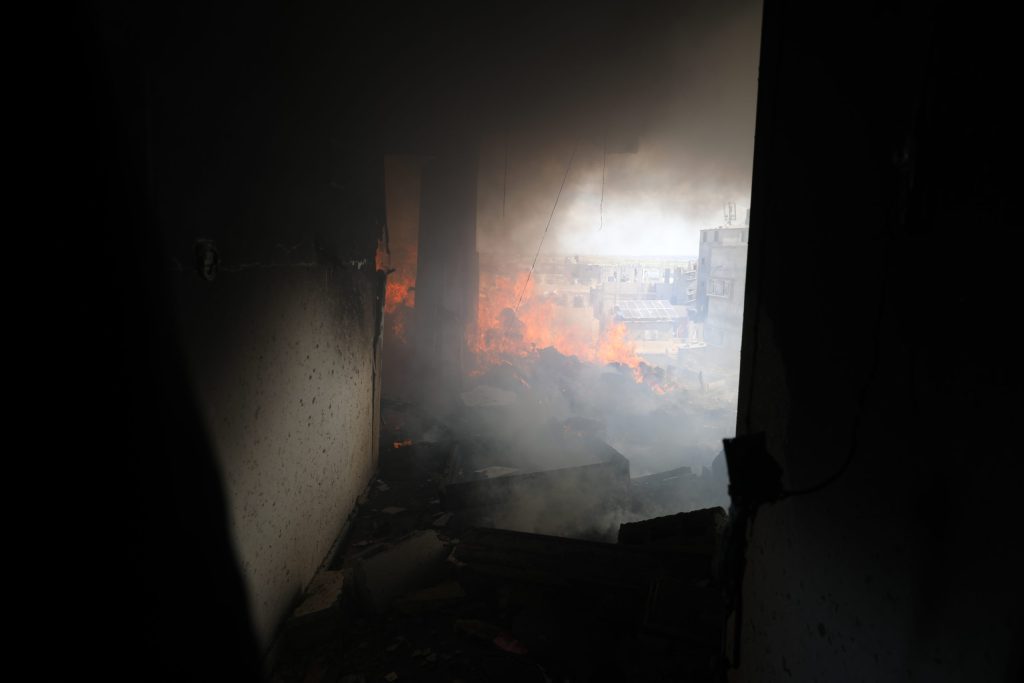Family Fleeing Violence Faces Tragedy
On Tuesday evening, in Qarara, located east of Khan Younis in southern Gaza, brothers Muhammad and Ibrahim Hamidi chose to evacuate their children to a safer area due to the intense gunfire from nearby tanks, a continuation of a night filled with relentless shelling. They aimed for the Mawasi region of Khan Younis, a coastal area previously designated as a “safe zone” during the conflict.
Upon reaching their destination, they set up tents for shelter. In the dead of night, Muhammad was startled by the noise of explosions. He hurried out of his tent, which was positioned several hundred meters from Ibrahim’s tent. Muhammad ran toward the sound of the blasts to assist victims—an all-too-frequent scenario in Gaza—only to discover that the tent that had been attacked belonged to his own brother.
“I dashed out, assuming the bombing had affected a family we were familiar with. When I arrived, I found my brother on the ground, bloodied, while his wife held their child, flames engulfing them,” Muhammad recounts to Mondoweiss. “My nephew lay injured, staring at his mother, who was caught in flames along with his baby brother, while he turned to look at his father, who was bleeding from a head wound caused by the missile.”
A Heart-Wrenching Loss
In deep sorrow, Muhammad reflected on his three-year-old nephew’s last moments as he witnessed his mother and brother burning. “The child was helpless,” he lamented.
In a tragic twist, when their mother was consumed by fire while holding her one-year-old son, she was also pregnant. All three lives were lost in the devastating incident.
“Rasha Abu Hindi was martyred while holding her son, Amir Hamidi,” Muhammad said, referring to his sister-in-law and her baby. “As for Ibrahim and his daughter, Ajnad, they have sustained critical injuries; we are uncertain of their fate now.” Although Ibrahim found work selling falafel after his place of employment was destroyed, Muhammad emphasized that his family had no involvement in political matters. “They were just an ordinary family—he was merely a father earning a living, and yet the Israeli ‘Defense’ Forces targeted them.”
Renewed Violence in Gaza
The Hamidi family, like millions across Gaza, found themselves once more facing the brutality of Israel’s attack after the official end of the ceasefire was announced on Tuesday. In mere hours, over 450 individuals were reported killed, as per the Gaza Ministry of Health.
Devastation of Whole Families
Muntaser Qreiqeh, located at the al-Ahli Arab Hospital in Gaza City, stood amidst the bodies of more than 30 family members. Many remained trapped under the rubble following a bombing of their residential area in the Shuja’iyya neighborhood. Most victims were women and children, with survivors noting that virtually the entire family was annihilated.
“All my cousins, all my relatives. [Israel] dropped explosive barrels on their heads as they slept,” Qreiqeh said to Mondoweiss. “My whole family is gone.”
Attempting to Recover the Lost
Not far from the location of the Qreiqeh family’s destruction, the Israeli army also targeted the al-Hattab family, killing 28 individuals in an airstrike that struck their building.
Survivor Sumaya al-Hattab pointed to what was once her family’s home, now effectively a grave. “This was where my father and uncles lived. The army bombed the house, killing all 28 occupants without exception; we’ve been unable to retrieve anyone from the ruins,” Hattab explained.
Only two infants were rescued from the collapsed structure. “They were discovered lifeless in their beds,” she said. “Most of those in the building were women and children; we are searching through the wreckage to find them because they were attacked in their slumber.”
Challenges in Recovery Efforts
Gaza’s Civil Defense teams are struggling to recover the deceased using makeshift methods due to a lack of heavy equipment, complicating retrieval efforts. Mahmoud Basal, a spokesperson for Civil Defense, noted that the fatalities from the Hattab family would add to the grim toll of 10,000 individuals trapped beneath the rubble, stating, “This massacre is among the most horrific incidents since the April 2024 tragedy at al-Shuhada Hospital. Despite previous warnings, the occupation has intensified its attacks and conducted over 100 aerial strikes in a single minute, resulting in more than 400 deaths, including over 170 children and 80 women—all at once,” Basal added, acknowledging the inadequacies in resources needed for recovery efforts.



